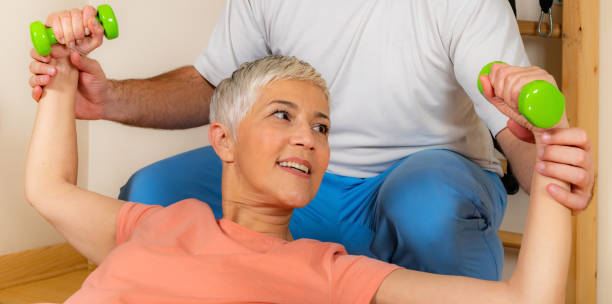
Maintaining an active lifestyle becomes increasingly important for our overall health and well-being as we age. Regular exercise offers a plethora of benefits, ranging from improved cardiovascular health and enhanced muscle strength to better mood and increased flexibility. However, the fear of exercising can be a significant barrier to embracing physical activity for many seniors. Whether it’s concerns about injury, unfamiliarity with modern exercise trends, or inability to keep up, these fears can hinder seniors from reaping the rewards of staying active.
If you’re a senior who finds yourself apprehensive about exercising or caring for an elderly loved one facing these concerns, read on for some valuable tips by Edmonton Home Care to help overcome the fear of exercising.
1. Emphasize the Benefits of Work Out
It is easy for older adults to have a negative perspective on exercise. For example, they may think about how their muscles get sore right after they exercise and claim it to be boring. Encourage our loved one to cultivate positive thinking about exercise by telling him or her the benefits of physical activity, like relieving pain related to arthritis.
2. Start Slowly
One of the primary fears seniors often have about exercising is that they might push themselves too hard and injure themselves. Start slowly and gradually build up your exercise routine to counter this fear. Begin with low-impact activities like walking, swimming, or gentle stretching. Over time, as your strength and confidence increase, you can incorporate more challenging exercises into your routine.
3. Discuss with a Doctor
Older adults who don’t exercise out of fear of getting hurt may feel more confident with a physician’s advice. During the medical appointment, ask your loved one’s doctor to choose a few safe exercise methods. A physician can reinforce some health benefits of exercising regularly, like enhancing balance and lowering blood pressure. Sometimes, a doctor may even provide tips for working out safely, like hiring an at-home caregiver for help.
4. Add Fun to Exercise
Show your aging loved one there is more to workouts than just jumping jacks and strenuous sit-ups. Introduce your loved one to the fun part of workouts like aqua aerobics and interactive video games that involve movement. Activities like walking through a park or gardening can enhance senior’s well-being.
5. Embrace Social Activities
Exercising alone can be intimidating, but participating in group activities can make it more enjoyable and less daunting. Look for local senior centers, community centers, or fitness classes for older adults. Engaging in activities with peers creates a supportive environment and provides opportunities for social interaction, which can combat feelings of isolation and boost motivation.
6. Track the Progress
Setting a goal will give seniors something to work toward. Help your loved one set realistic goals like walking for an extra five minutes every day until he or she can manage a full workout. Set up a calendar or chart to mark his or her progress. Having progress noted on a chart or calendar will encourage your loved one to do his or her best.
7. Educate Yourself
The fitness world has evolved, and new exercise trends and equipment might seem intimidating to seniors. However, education can empower you to embrace these changes. Consider taking a class or working with a personal trainer specializing in training older adults. They can introduce you to modern exercise techniques, equipment, and safety practices, helping you feel more confident in the gym or at home.
8. Practice Mindfulness and Relaxation
Fear of exercising can sometimes be related to anxiety about the unknown or not meeting certain expectations. Mindfulness and relaxation techniques, such as deep breathing, meditation, or yoga, can help manage these feelings. These practices promote a sense of calmness, allowing you to approach exercise with a clearer mind and reduced anxiety.
In conclusion, many seniors are afraid to exercise, but they can overcome this fear. With the right approach and mindset, seniors can gradually overcome these fears and enjoy the many physical, mental, and emotional benefits of regular exercise. However, aging in place can pose a few challenges for seniors. If an older person you care about needs help sometimes or all the time, you can think about getting them professional care from Home Care Edmonton Just remember, starting to exercise might seem tough initially, but the good things it brings to your health and life are worth it.

